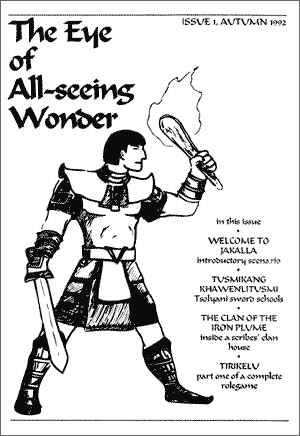I think the best way to introduce players to this wonderfully detailed world is to start their characters with as little knowledge of Tékumel as the players have. This means using a "Fresh Off the Boat" beginning scenario, where the characters are tribal barbarians from a distant (and simpler) part of Tékumel, a milieu more familiar to players. Primitive tribes are similar on Earth and on Tékumel.
Rules
The other choice to make is in the matter of rules. Five sets of official rules have been written for Tékumel: Empire of the Petal Throne from TSR, Swords and Glory from Gamescience, Gardasiyal from Theater of the Mind Enterprises, Tékumel: Empire of the Petal Throne from Guardians of Order, and Bethorm: The Plane of Tekumel from UniGames. Several other rules sets have between written specifically for Tékumel, including Tirikelu and The Petal Hack. There are also quite a few generic systems that have been adapted to Tékumel, like GURPS and BRP. Each of them has advantages and drawbacks, which I won't go into here.For me, the original Empire of the Petal Throne rules are the best place to start. My reasoning goes as follows:
- EPT supplies a rich amount of setting material. I feel that the description of Tekumel in EPT is the most concise of all of the rules, yet delivers the flavor of the place, including all nations and non-humans.
- This set of rules is full of adventuring material. It contains all manner of animals and monsters, examples of play, and it is generously sprinkled with tidbits of information that provide the seeds of many an undertaking.
- It is a straightforward set of rules, close enough to D&D to be recognizable, yet specific to Tekumel. It only takes 10 minutes to roll up characters.
- Retro gaming is in. EPT is easily suited to Old School-style of roleplaying since it helped invent Old School.
- It costs $10 for the PDF or $20 for a POD book from DriveThruRPG for a complete playable game. All the monsters, all the neat treasures, all the nations, all the non-humans, all the politics, everything.
- James Maliszewski has a series of modifications to EPT published in his Tekumel fanzine, The Excellent Travelling Volume. Character rules for nonhumans and non-Tsolyani are added as well as other tweaks.
- Moving to another set of rules once your players are hooked and you are more familiar with the setting is not that hard. Either you can convert your characters to the new system, or you just start over with new characters, perhaps ones from within Tsolyani society.

The Setting
Once you've read the EPT rules, the next step is to get more familiar with Tékumel. For this I have a low-cost suggestion -- read The Man of Gold and Flamesong, the first two novels by Professor Barker. Man of Gold has Kindle and POD versions. I found many old paperback copies of each for just a few bucks including shipping on Amazon and ABEBooks.com. These books give you a feel for the world and how things work.First Campaign
Now, find someYou now have your erstwhile tribes folk -- they need a reason to be in Tsolyanu. There is nothing like a disaster to get people moving. The disaster could be environmental (drought, locusts, erupting volcano), economic (crash in dna-grain prices), or political (war, invading marauders, etc.). Pick a disaster. Force the tribe off their land and onto a ship headed for Jakalla or, if you are truly perverse, Penóm (my first GMs were truly perverse).
An article in the Eye of All-Seeing Wonder #1 gives exactly this beginning. It's called Welcome to Jakalla by Michael Cule. A really good thing about this article is that it supplies a large amount of description of what the characters experience. I recently used this as the basis for a game that I was commissioned to run last month. I changed the mission at the end of the adventure, but the setup is so good I kept it all. This adventure has the entire tribe moving to Tsolyanu, which makes for a good base to start with.
Now you have a solid starting point for adventures in the Imperium. Who knows, maybe the characters will get into a temple or maybe even a clan!

Excellent post and one that really rings true to my own recent experience. It really is a lot easier to stop over-worrying it and just start playing. Start simple and classic and then just add the layers as the sessions progress.
ReplyDeleteIt works. We have been doing the dual-GM Jakalla campaign now for five months on Google Plus for a total of around 20-25 players all new to the setting.
Maybe I'll stop in and play some day.
DeleteBravo Brett. I started with Original EPT (1974) then quickly there-after read copies of MoG and FSong (as you recommend above) I bought off Amazon as used books. I whole-heartily agree it was a great starting point. It was a great amount of background material, an easy rule-set to start off with, and adding in the books gave me a good sense of "how it should/can be run". I ended up converting the rules to WEG's D6 Fantasy system, but remained very close to the original ept rules throughout. They 'married' well; just as GURPS and other rules light systems click with it as well.
ReplyDeleteThanks. I like D6, though I've only played it once. I'm planning on converting my GURPS Tekumel rules to GURPS 4E sometime this year.
DeletePretty much...
ReplyDeleteI would add only one thing that is so obvious it's sometimes overlooked and forgotten: find that one thing in the setting that sets your imagination on fire and run with it - if you believe in it your players will, too.
I love the Underworld, so I nearly always start there as the first adventure.
Delete